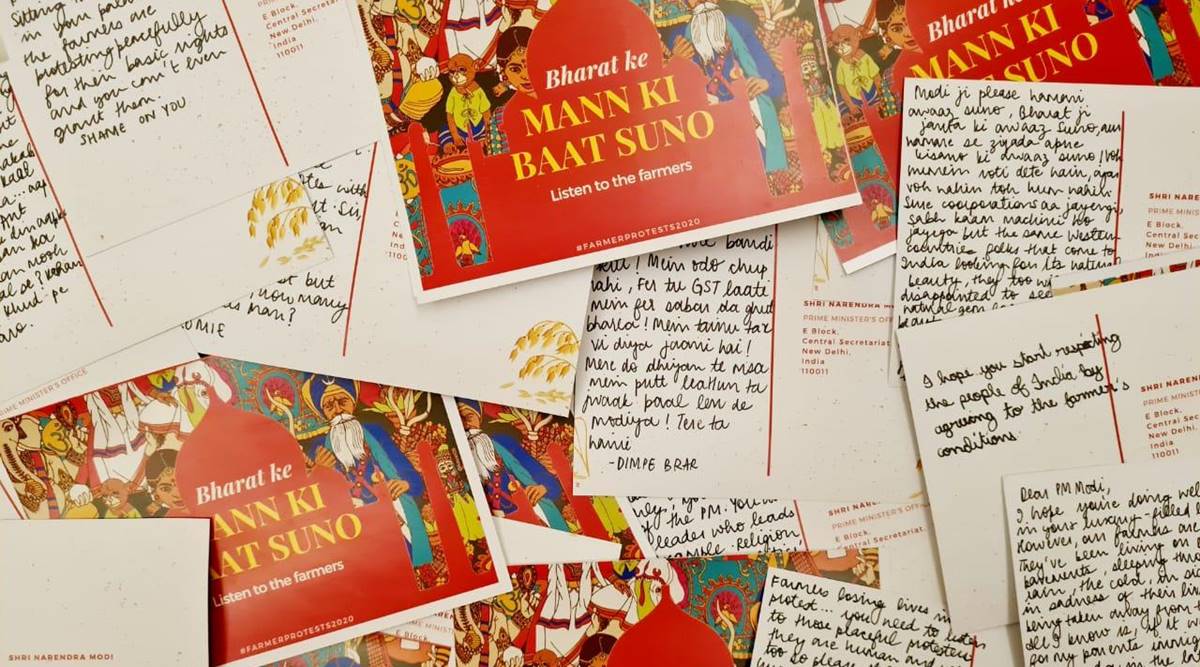While the unions deliberate over the government’s offer, some professionals and volunteers are making sure that farmers’ ‘Mann Ki Baat’ on the agri laws reaches Prime Minister Narendra Modi.
While the government may have yielded some ground on the three contentious farm laws proposing to suspend their implementation for 1-1.5 years, the fight for those demanding the repeal of the legislations, including the farmers and their supporters, is far from over.
While the unions deliberate over the government’s offer, some professionals and volunteers are making sure that farmers’ ‘Mann Ki Baat’ on the agri laws reaches Prime Minister Narendra Modi.
Picking the basic premise of PM’s radio programme in which he opens his heart on several issues, it has been urging farmers and the general masses to sharing their thoughts on the agri laws with the Prime Minister – their ‘Mann Ki Baat’ being sent to Modi via post cards.
The unique campaign – Bharat Ke Mann Ki Baat Suno, Kisaano Ke Mann Ki Baat Suno – has been started by ‘Hamari Awaaz’, an umbrella group under which several professionals and volunteers have joined hands.
Kanwar Deep Kaur, one of the initiators of the campaign, said that PM reaches out to the common people through his radio talk but that is only a one-way communication. She said they felt the need for a way to make messages of farmers reach the PM. “Now he (PM) too should listen to the ‘Mann Ki Baat’ of farmers and others. Thousands of farmers are sitting on protest at Delhi’s borders in this biting cold and lakhs of others who are not farmers, are also supporting them but the government is not listening to them. We are a democracy and it is our right to make the farmers’ voice reach the PM in a peaceful and democratic way,” she said.
The group ‘Hamari Awaaz’ aims to make ‘Bharat Ke Mann Ki Baat Suno’ the world’s biggest letter drive.
Kaur said that already nearly 10,000 postcards have been filled by farmers and ordinary persons supporting the agriculturists. “We have kept the postcards at Singhu and Tikri border protest sites where volunteers are getting them filled by the farmers. District level volunteers are also getting postcards filled in Bathinda, Jalandhar etc. Others are sending their messages online and we write it on the postcards on their behalf,” she said.
Here’s what some of the postcards read
- “Kehte hain boond boond se sagar banta hai, to chalo chhoti si boond hi ban jaate hain, aur aawazon ka ek sagar banate hain (They say little drops make the ocean, let’s be those tiny drops and create an ocean of voices””.
- “If you eat, Thank God and farmers. Please listen to their voice. I am a corporate worker and no one is farmer in my family. But as I eat, as I belong to this country India, all farmers are my family. Please remove these Bills”.
- “Mr PM, It’s our humble request that you listen to our beloved farmers. They have been sitting on borders… Many have lost their lives…it’s your responsibility to listen to the people”.
- “…a very simple definition of democracy is ‘government of the people, for the people and by the people’…Please don’t change this definition.”
- “It is high time that you give farmers what they deserve for their years of hardwork. Don’t wait for more deaths of innocent farmers. Be a human first and a politician after”.
A volunteer associated with ‘Hamari Awaaz’, requesting anonymity, s”id, “Let’s write to PM for farmers’ rights. We want to give power back to the people where their voices are heard. Article 19 of the Constitution guarantees freedom of speech and expression. If we can respect PM’s Mann Ki Baat as citizens of India, we should also express ‘Bharat Ke Mann Ki Baat’, hence this cam”aign”.
The volunteer said that many people working for the campaign are hesitant of revealing their identities as they have got scared after the National Investigation Agency (NIA) sent notices to some protesters and their supporters in a case related to Sikhs for Justice (SFJ) and Khalistan.
On why postcards has been chosen as a medium to reach out to PM, Kaur said, “Writing postcards or letters for human rights has been successfully used by international organizations. Moreover one can write in whichever language they are comfortable”.
Source: Read Full Article


